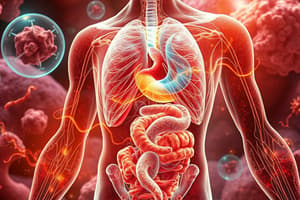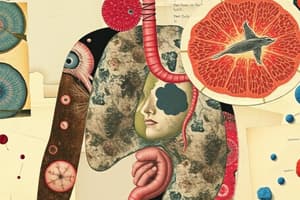Podcast
Questions and Answers
What is the primary function of the respiratory system?
What is the primary function of the respiratory system?
- Sends messages between the brain and body
- Bringing oxygen into the body and expelling carbon dioxide (correct)
- Controlling the absorption and digestion of food
- Controls the movement of blood through the human body
Which is the largest organ in the human body?
Which is the largest organ in the human body?
- Eyes
- Nose
- Mouth
- Skin (correct)
What organs are part of the major external organs in humans?
What organs are part of the major external organs in humans?
- Kidneys and lungs
- Brain and spinal cord
- Heart and liver
- Eyes, ears, and nose (correct)
Which system is responsible for controlling the absorption and digestion of food?
Which system is responsible for controlling the absorption and digestion of food?
How do scientists determine which organs are in the same group or system?
How do scientists determine which organs are in the same group or system?
What is the smallest functional and structural unit of all living organisms?
What is the smallest functional and structural unit of all living organisms?
What is a group of tissues that perform a specific function?
What is a group of tissues that perform a specific function?
Which of the following is NOT a major internal organ of the human body?
Which of the following is NOT a major internal organ of the human body?
What is a collection of organs called?
What is a collection of organs called?
Which system is responsible for carrying oxygen and nutrients to the body's cells and removing waste products?
Which system is responsible for carrying oxygen and nutrients to the body's cells and removing waste products?
Flashcards are hidden until you start studying
Study Notes
Respiratory System
- The primary function of the respiratory system is to facilitate the exchange of oxygen and carbon dioxide.
Human Body Organs
- The skin is the largest organ in the human body.
- The major external organs in humans include the skin, eyes, ears, nose, and tongue.
Digestive System
- The digestive system is responsible for controlling the absorption and digestion of food.
Organ Classification
- Scientists determine which organs are in the same group or system based on their functions and structures.
Cellular Biology
- The smallest functional and structural unit of all living organisms is the cell.
Tissue Classification
- A group of tissues that perform a specific function is an organ.
Internal Organs
- The kidneys are a major internal organ of the human body.
- The heart is a major internal organ of the human body.
- The liver is a major internal organ of the human body.
- The stomach is NOT a major internal organ of the human body (it's a part of the digestive system, but not one of the major organs).
Organ Systems
- A collection of organs that work together to perform a specific function is a system.
- The circulatory system is responsible for carrying oxygen and nutrients to the body's cells and removing waste products.
Studying That Suits You
Use AI to generate personalized quizzes and flashcards to suit your learning preferences.




